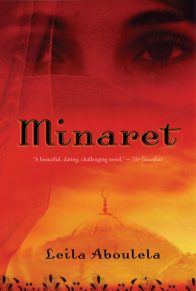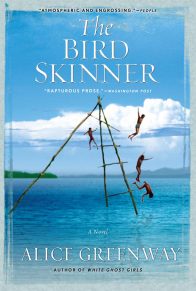“A sensual, haunting story of sibling love, danger and infatuation with the unknown. . . . This is a brave and artful book, not less powerful for its economy, but perhaps even more so because of it.” —Vendela Vida, New York Times Book Review
“Greenway is a remarkable young writer who vividly evokes Hong Kong’s sights, smells, and sounds . . . in poetic, finely detailed prose. What’s more, she seems to have remembered every single charged emotion from adolescence and filters them all through the sisters’ fierce, complex relationship. A heartbreakingly beautiful debut.” —Joanne Wilkinson, Booklist (starred review)
“An auspicious debut sensitively and impressionistically evokes adolescent turmoil. . . . Greenway vividly conjures up the fears, passions and fantasies of a teenager against a heart-rending political background. Assured, sensuous and brilliantly colored.” —Kirkus Reviews (starred review)
“Brilliantly wrought . . . A compelling, heartbreaking, and original first novel. Highly recommended.” —Library Journal (starred review)
“A gut-wrenching exploration of the complexities of sisterly love, delivered with vividness and poignancy. As you close the book, you will find yourself—like the narrator—haunted by events of a summer long ago.” —Judy Fong Bates, The Washington Post
“Gorgeously sad first novel”The place and its politics are as strange and seductive, lush and frightening, as the beginning of adulthood. Greenway captures the world around the girls in glorious, full-throated detail.” —Sarah Blake, Chicago Tribune
“[A] marvelous first novel. Greenway’s evocation of place and time, as well as her rich, lyrical overlay of Chinese culture, are written in a clean, confident style. Like a good poem or short story, its brevity compresses ideas and imagery into an elegant, memorable package.” —Irene Wanner, San Francisco Chronicle
“A story laid out with care, visceral in its detail of Hong Kong’s colors and sounds and smells, and authentic.” —Alan Moores, Seattle Times
“As haunting as it is evocative . . . Sensuous and disturbing . . . What gives the novel its remarkable bite is the fraying of the protective, competitive realm of the sisters.” —Betsy Willeford, Miami Herald
“Astonishingly pitch-perfect and sensual . . . Greenway plunges us right into a low-to-the-ground exploration of the smells, sights and corners a child can experience more easily than an adult. . . . Greenway has accomplished an almost magical feat by bringing us so close to a place and time fraught with danger and beauty. . . . You will become submerged in this novel. It is that good.” —Karen Thompson, The State (Columbia, SC)
“Rich as they are, the sensuous and disturbing descriptions are secondary to Greenway’s story. What gives the novel its remarkable bite is the fraying of the protective but competitive realm of the sisters who jostle for their father’s attention.” —Betsy Willeford, the Times of Trenton
“A novel that uses lyrical prose and intricately sensual detail to tell a complicated story of illicit excitement, impulsive transgression and ill-fated adventures.” —Ada Tseng, Asia Pacific Arts (UCLA)
“She not only brings alive her characters but also uses vivid word choices–much like sparse, crisp brush strokes of a Chinese painting–to bring to life the Hong Kong of her memory.” —Beth Kanter, Pages
“Greenway is a beautiful writer, offering us a cinematic portrayal of adolescence in an alien world.” —Ghlas Ferguson, Books Quarterly
“The reader’s every sense is engaged, thanks to a poetic and lushly detailed description of the exotic setting. Reading White Ghost Girls feels like drifting, fear-filled, through a foreign land within a sultry dream while being pierced through with Kate’s emotions: love, jealousy, passion, loss and longing. Highly recommended.” —Terry Miller Shannon, Bookreporter.com
“Slim and lyrical debut novel . . . In Hong Kong, the heat is on.” —David Lau, Time Asia
“Fresh and sensual . . . Vividly written . . . Always manages to be marvelously descriptive without being remotely overwritten.” —David Robinson, The Scotsman
“Greenway’s writing is sharp, and her rendering of the febrile atmosphere well done. . . . The air of unease and the political tensions apparent in the background lend it an extra dimension.” —Jerome de Groot, Time Out London
“An admirably concise economic novel of growing up, growing apart, and the end of innocence.” —Choice (UK)
“Taut, exquisite, elegiac . . . White Ghost Girls is about the personal and the political in a meaningful way, and with her poised descriptive prose, controlled storytelling and deep characterizations, Greenway offers a new, compelling and painful view of the upheavals in the Far East in the 1960s.” —Laurence Phelan, The Independent on Sunday (UK)
“Promising debut novel.” —The Sunday Tribune(UK)
“A haunting first novel written with the craft and grace of a master. Don’t miss it!” —Isabel Allende
“Alice Greenway’s White Ghost Girls is a stunning debut—ferocious, sensual, witty, elegantly wrought. The scene is Hong Kong circa 1970, and the girls are expatriate teenagers navigating adolescence and violent political upheaval all at once. But the true subject of the book is neither adolescence nor political but longing, and the grief that follows. This short novel can be read at a sitting and, once read, is unforgettable.” —Ward Just
“Alice Greenway’s White Ghost Girls is a ravishingly beautiful novel about sisters and about memory and about loss. And, as only true works of art can do, in focusing on the personal story, it brightly illuminates a great political and historical issue: White Ghost Girls gives us an utterly surprising and deeply resonant view of the American war in Vietnam. Heartbreakingly beautiful, richly sensual, this is a truly exciting debut novel by an extraordinarily talented new writer.” —Robert Olen Butler
“White Ghost Girls is so rich with detail and so charged with the colors and flavors of Hong Kong in the shadows of the Vietnam War that it’s not only a great read, it’s an olfactory experience. Scents both sweet and pungent leap off the page, lending a poignant backdrop to the story of Kate and Frankie, two sisters coming of age in a part of the world undergoing a wrenching transformation. Alice Greenway captures the innocence of her young narrator with a voice that echoes with hard-earned wisdom, heartbreak, and love for a time and place.” —Meghan Daum, author of The Quality of Life Report and My Misspent Youth
“White Ghost Girls is a lovely book, graceful, poignant and precise. It’s about memory and love and homesickness, and how war will tear a family apart from afar.” —Roxana Robinson, author of A Perfect Stranger: And Other Stories
“Alice Greenway’s sensuous prose is exhilarating and her command of her heartbreaking story is total. White Ghost Girls is an original and beautiful novel, startling in its power.” —Beth Gutcheon, author of Leeway Cottage
“A lyrical, dreamlike novel . . . I loved the symmetry of this book, and the myriad, beautiful details that brought the era to life. Though the atmosphere is political, the story is deeply personal, about one family’s hunger for love and closeness, eerily underscored by a war that exacted a similar toll on the landscape and people of Viet Nam.” —Gina Webb, Tall Tales Books, Atlanta, GA
“White Ghost Girls is the story of Frankie and Kate, two American sisters, the daughters of a photojournalist who is covering the Vietnam War. Living with their mother in Hong Kong, they watch not only the war unfold in Vietnam, but, also, the Maoist Cultural Revolution. Greenway’s descriptions of places, of feelings and emotions, of all family members are captivating.” —Susan Weaver, Broad Street Books, Portsmouth, VA, Book Sense quote













